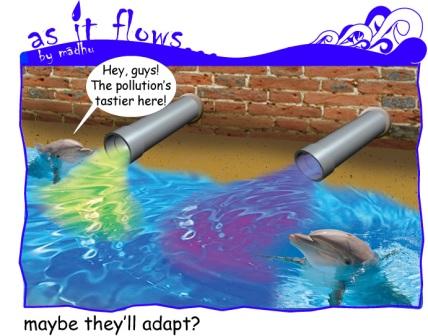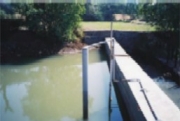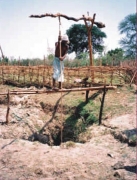Biodiversity
Salvaging and scapegoating: Slum evictions on Chennai’s waterways - EPW paper
Posted on 02 Aug, 2010 01:03 AMThe paper highlights the case of recent projects that have been planned on the river Cooum in Chennai.
Environmental flows: Free-flowing rivers around the world
Posted on 30 Jul, 2010 11:56 AMThis is the first in a new series of articles that IWP will host on various aspects of Environmental Flows. We welcome your comments and original articles for this series, please mail us at portal@arghyam.org
The other side of the story: Free-flowing rivers around the world
With around 5100 large dams, India ranks third in the world with regards to the number of large dams. The ongoing debate over the economic, social and environmental costs of large dams has indicated many times that these costs are not commensurate with their benefits. Although we have dammed all our major rivers, (except Brahmaputra and plans to dam its major tributaries are on way, some like Ranganadi have already been dammed), profoundly changing their hydrological, ecological, social and cultural systems, we are yet to form a policy which states that environmental flows in rivers are a necessity. It is more than clear now that environmental flows relate to well being of not only ‘birds and fishes’, but also of the entire human society . Take an example of fisheries, lack of flows in rivers and contractor-owned reservoir fishing has affected the livelihood of hundreds of thousands of small fishermen . Environmental flows also dilute pollution load, so let us not hide behind the fact that pollution is wiping out our riverine fish, not the absence of flows. It is also clear that environmental flows do NOT mean a decommissioning of all the present dams, nor do they mean any random figure like 60% or 10% of MAR . Eflows require reaching a wise compromise through science and local negotiations, for each river.
While many countries have put in place policies and laws for maintaining environmental flows in their rivers, there is also a rarer category: Rivers which have not been dammed yet, rivers which retain their connection from the source to the sea, nurturing myriad ecosystems and communities in their wake! These are known by many names like Free flowing rivers, Wild Rivers, Pristine/ Virgin rivers, Heritage Rivers, etc., each indicating their rare character and value. In ecological and cultural terms, the value of these rivers is immense and as more and more rivers are being dammed the world over, this value is increasing steeply. Unfortunately, in today’s economic terms, these rivers are still waiting to get their due recognition, but as human systems evolve, they will surely be seen as ‘invaluable’ service providers with phenomenal use and non use values.
Dr. G. D. Agrawal , the scientist, environmentalist and rishi
Posted on 27 Jul, 2010 03:52 PMDr. G. D. Agrawal Scientist and Rishi
Meeting Dr. G. D. Agrawal in his spartan, two room cottage in Chitrakoot, Madhya Pradesh, you would never guess what an accomplished and distinguished scientist he is – first Member-Secretary of the Government of India’s Central Pollution Control Board, former Head of the Department of Civil and Environmental Engineering at IIT Kanpur and a PhD from the University of California, Berkeley. The list goes on and on.
Yet this eminent professional sweeps his own floors, washes his own clothes and cooks his own meals. He retains only a few possessions and dresses in homespun khadi. At the age of 76, his main mode of transport within Chitrakoot is a bicycle and when he travels further afield, he goes by ordinary bus and second-class train. These are the deliberate choices of a devout Hindu whose deepest values are for simplicity and reverence for nature. Dr G.D. Agrawal is the doyen of environmental engineering professionals in India. Well past retirement, he continues to teach and inspire students as an Honorary Professor of Environmental Sciences at the Mahatma Gandhi Chitrakoot Gramodaya Vishwavidyalaya, in Chitrakoot (M.P.).
Protecting Pili river from land and pond encroachment
Posted on 27 Jul, 2010 02:50 AMdear all, I have sent several mail to concern department including minster jairam romesh regarding the Protecting PILI river , due to filling pond , taal , river land , dam to a river land encroachment in my village KOPA , Unfortunately, I still haven't received my reply .
Relevance of Meltwater in River Basin Hydrology
Posted on 23 Jul, 2010 10:53 PMA peer paper in Science Magazine focuses on the core of a riverine system, the upstream basin, and its impact on the entire river basin.
Proposing a National River Authority of India (NRAI)
Posted on 23 Jul, 2010 04:29 PMIntervening at the urgency of the water situation of the country and need in larger interest of the people and nation from political, legal, social, administrative, commerce,trade,cultural, world tourism angles, apart from agricultural and drinking water angle; annual devastation by floods,and loss by drought. One single Authority, with P.M. as Chairman may hopefully bring expected and good results in river management; riverine rejuvenation - National River Authority of India
Here is a draft proposal for such an authority to be created.
We are looking for collaborations on making this a reality.
Please post your comments.
Prof G.D. Agrawal resumes fast unto death to save the Ganga, Swami Avimukteshwaranand and others to join in support
Posted on 21 Jul, 2010 11:10 AMForwarded to the Portal by: Ayan Biswas
Image and News Courtesy:
Shankracharya designate Swami Avimukteshwaranand ji presided over an emergency meeting organized by Manushi Sangathan, Ganga Ahvaan and Ganga Yamuna Jal Biradri to express our strong protest against the patently illegal decision of the Group of Ministers giving clearance to the Loharinag-Pala dam on the Ganga River. The following expert members of the NGRBA also participated in the meeting to express their strong protest having been kept in the dark about the appointment of the GoM which has passed a virtual death sentence on the most sacred river of India: Rashid Hyatt Siddiqui, Rajendra Singh, Rama Raota and Ravi Chopra.
Environment flows - Continuing the discussion
Posted on 21 Jul, 2010 12:41 AM
Augmenting groundwater resources by artificial recharge: A case study - Kolwan valley - A report by ACWADAM
Posted on 19 Jul, 2010 04:45 PM This report by ACWADAM describes the results of a research study conducted under the DFID funded AGRAR project at the Kolwan site in Pune district of Maharashtra state in India. The research focused on studying the usefulness of artificial recharge to augment groundwater resources through watershed development.
This report by ACWADAM describes the results of a research study conducted under the DFID funded AGRAR project at the Kolwan site in Pune district of Maharashtra state in India. The research focused on studying the usefulness of artificial recharge to augment groundwater resources through watershed development.
An important criterion of the study was also to understand the impact of artificial recharge on already changing livelihoods in areas where watershed development was conducted on a large scale.
A rapid geohydrological study of microwatersheds from Bolangir district, Orissa state - A report by ACWADAM
Posted on 16 Jul, 2010 03:50 PM This document by ACWADAM is a report of a rapid geohydrological assessment of some of the microwatersheds from parts of Bolangir district Orissa.
This document by ACWADAM is a report of a rapid geohydrological assessment of some of the microwatersheds from parts of Bolangir district Orissa.
Bolangir district in Orissa forms a part of one of the hottest and backward regions of India with low land-productivity, and opportunities and technologies for agriculture in the district remain relatively unexplored.
Vagaries of rainfall and the underlying hard-rock geology further compound the problem and limit agricultural productivity to a great extent. Given such natural uncertainties, systematic implementation of a watershed management programme is the most viable avenue to overcome the problems of this region.
Bolangir district was thus selected as pilot area to conduct a pre-feasibility exercise for planning of water resources management. ACWADAM, Pune was invited, along with Samaj Pragati Sahayog, Bagli to conduct this pre-feasibility exercise.





